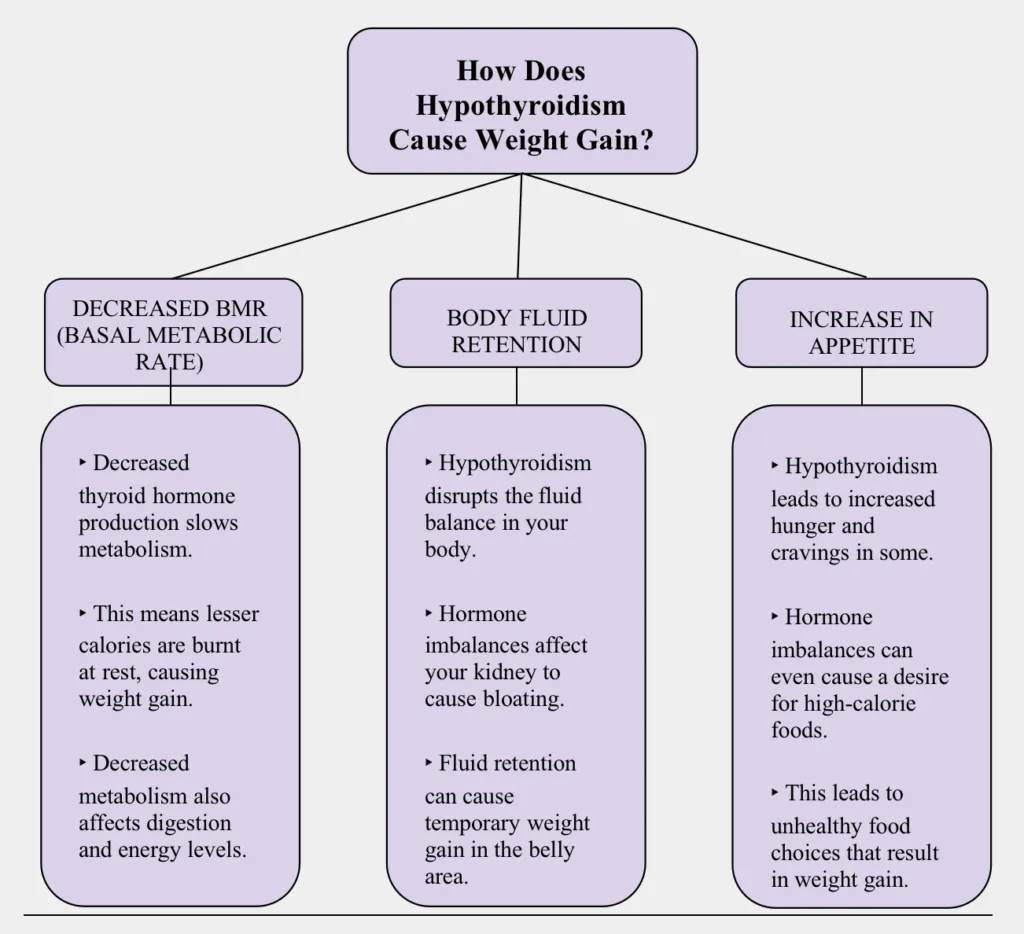Expert diet and lifestyle tips to help you achieve your weight loss goals with hypothyroidism!
Losing weight can be a challenging journey, especially when dealing with hypothyroidism. The underactive thyroid gland can slow down metabolism, affect energy levels, and make it more difficult to shed excess pounds. As a medical condition that has no cure, many people consider their hypothyroidism diagnosis to be the end of their normal lifestyles. When the weight gain troubles start to show, people lean towards either giving up on their fitness goals or their favorite foods.
But we are here to tell you that you don’t have to sacrifice everything you love just because of a hypothyroidism diagnosis. Here are the best expert-backed hypothyroidism diet plan and lifestyle tips that get you back on track.
How Does Hypothyroidism Cause Weight Gain?
Studies show that an estimated 200 million people suffer from thyroid issues around the world. Hypothyroidism is the most prevalent one among these issues. Hypothyroidism is a common endocrine disorder caused by an underactive thyroid gland. When the thyroid gland produces insufficient thyroid hormones, a lot of your bodily functions are affected. The most obvious result of inadequate thyroid hormone production is weight gain. And the worst part? Hypothyroidism makes losing this weight even harder on you!
Here is how hypothyroidism can cause you to gain weight and not lose.
Understanding the connection between hypothyroidism and weight gain is essential. When dealing with hypothyroidism, a proper Hypothyroidism Diet is crucial for managing symptoms and promoting weight loss. A well-balanced Hypothyroidism Diet can help regulate metabolism, boost energy levels, and support overall health.
Hypothyroidism Diet focuses on nutrient-dense foods that aid thyroid function. Foods rich in selenium, iodine, and zinc are vital for thyroid health. Including lean proteins, whole grains, fruits, and vegetables in your Hypothyroidism Diet can help manage weight effectively.
Avoiding processed foods and sugars is also essential in a Hypothyroidism Diet. These foods can disrupt thyroid function and lead to further weight gain. Instead, opt for healthier alternatives that align with your Hypothyroidism Diet plan.

Diet Tips for Weight Loss with Hypothyroidism
Maintaining a healthy diet is crucial for managing weight with hypothyroidism. Certain dietary strategies can help support weight loss efforts while navigating complex challenges that an underactive thyroid presents. Try incorporating these simple dietary tips into your daily lives. These small changes will make a big difference in your weight loss efforts.
Practice Portion Control
Pay attention to portion sizes to prevent excessive calorie intake. Use smaller serving dishes, focus on your food, and be mindful of your satiety cues while eating.
Optimize Iodine Intake
Iodine is essential for thyroid hormone production. Ensure sufficient intake by including iodine-rich foods like seaweed, fish, dairy, and iodized salt in your Hypothyroidism Diet.
Focus on Macronutrients
Optimize your macronutrient distribution by consuming adequate food varieties. Experiment with different food ratios and unprocessed foods in your Hypothyroidism Diet.
Lifestyle Tips for Weight Loss with Hypothyroidism
While dietary modifications go a long way in helping you lose weight, it is simply not enough when you face the challenges of hypothyroidism. The best way to ensure the effectiveness of your Hypothyroidism Diet is by supporting it with lifestyle adjustments. Try adopting these easy lifestyle habits to lose weight and improve your overall wellness.
Stay Consistently Hydrated
Drink at least 8 glasses of water throughout the day to support metabolism. Avoid sugary beverages and aerated drinks as these do more harm than help.
Seek Emotional Support
You need a good support system when dealing with hormone imbalances that affect your appearance. Try talking to a dietician, therapist, or group with similar goals.
Track Your Progress
Tracking your progress keeps you accountable for the decisions you make. Keep track of your calorie intake, exercise, and weight to celebrate milestones.
Conclusion: Overcome the Hurdles of Hypothyroidism!
While hypothyroidism may present unique challenges, it is important to remember that weight loss is achievable with the right approach and support. By understanding how hypothyroidism impacts your body and working closely with a certified dietitian, you can achieve all your fitness goals.
Remember, progress may be gradual. But a well-planned Hypothyroidism Diet and lifestyle changes can help you overcome the hurdles of hypothyroidism and achieve your weight loss journey and fitness goals.






